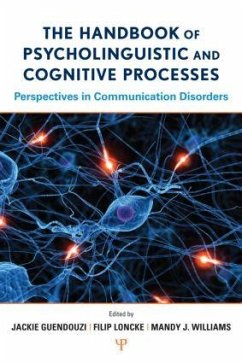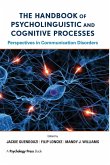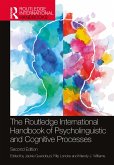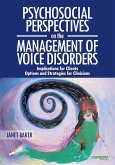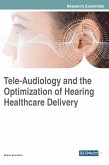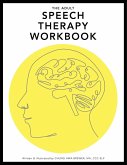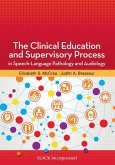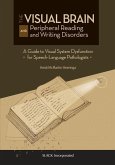The Handbook of Psycholinguistic and Cognitive Processes
Perspectives in Communication Disorders
Herausgeber: Guendouzi, Jackie; Williams, Mandy J.; Loncke, Filip
The Handbook of Psycholinguistic and Cognitive Processes
Perspectives in Communication Disorders
Herausgeber: Guendouzi, Jackie; Williams, Mandy J.; Loncke, Filip
- Gebundenes Buch
- Merkliste
- Auf die Merkliste
- Bewerten Bewerten
- Teilen
- Produkt teilen
- Produkterinnerung
- Produkterinnerung
This book includes a basic overview of areas of cognition and language processing relevant to the field of communication disorders and provides examples of theoretical approaches to problems and issues in communication disorders.
Andere Kunden interessierten sich auch für
![The Handbook of Psycholinguistic and Cognitive Processes The Handbook of Psycholinguistic and Cognitive Processes]() The Handbook of Psycholinguistic and Cognitive Processes76,99 €
The Handbook of Psycholinguistic and Cognitive Processes76,99 €![The Routledge International Handbook of Psycholinguistic and Cognitive Processes The Routledge International Handbook of Psycholinguistic and Cognitive Processes]() The Routledge International Handbook of Psycholinguistic and Cognitive Processes281,99 €
The Routledge International Handbook of Psycholinguistic and Cognitive Processes281,99 €![Psychosocial Perspectives on the Management of Voice Disorders Psychosocial Perspectives on the Management of Voice Disorders]() Janet BakerPsychosocial Perspectives on the Management of Voice Disorders195,99 €
Janet BakerPsychosocial Perspectives on the Management of Voice Disorders195,99 €![Tele-Audiology and the Optimization of Hearing Healthcare Delivery Tele-Audiology and the Optimization of Hearing Healthcare Delivery]() Tele-Audiology and the Optimization of Hearing Healthcare Delivery235,99 €
Tele-Audiology and the Optimization of Hearing Healthcare Delivery235,99 €![The Adult Speech Therapy Workbook The Adult Speech Therapy Workbook]() Chung Hwa L BrewerThe Adult Speech Therapy Workbook94,99 €
Chung Hwa L BrewerThe Adult Speech Therapy Workbook94,99 €![The Clinical Education and Supervisory Process in Speech-Language Pathology and Audiology The Clinical Education and Supervisory Process in Speech-Language Pathology and Audiology]() Elizabeth McCreaThe Clinical Education and Supervisory Process in Speech-Language Pathology and Audiology91,99 €
Elizabeth McCreaThe Clinical Education and Supervisory Process in Speech-Language Pathology and Audiology91,99 €![The Visual Brain and Peripheral Reading and Writing Disorders The Visual Brain and Peripheral Reading and Writing Disorders]() Heidi HeeringaThe Visual Brain and Peripheral Reading and Writing Disorders78,99 €
Heidi HeeringaThe Visual Brain and Peripheral Reading and Writing Disorders78,99 €-
-
-
This book includes a basic overview of areas of cognition and language processing relevant to the field of communication disorders and provides examples of theoretical approaches to problems and issues in communication disorders.
Hinweis: Dieser Artikel kann nur an eine deutsche Lieferadresse ausgeliefert werden.
Hinweis: Dieser Artikel kann nur an eine deutsche Lieferadresse ausgeliefert werden.
Produktdetails
- Produktdetails
- Verlag: Psychology Press
- Seitenzahl: 874
- Erscheinungstermin: 7. September 2010
- Englisch
- Abmessung: 235mm x 157mm x 51mm
- Gewicht: 1391g
- ISBN-13: 9781848729100
- ISBN-10: 1848729103
- Artikelnr.: 29947752
- Herstellerkennzeichnung
- Libri GmbH
- Europaallee 1
- 36244 Bad Hersfeld
- gpsr@libri.de
- Verlag: Psychology Press
- Seitenzahl: 874
- Erscheinungstermin: 7. September 2010
- Englisch
- Abmessung: 235mm x 157mm x 51mm
- Gewicht: 1391g
- ISBN-13: 9781848729100
- ISBN-10: 1848729103
- Artikelnr.: 29947752
- Herstellerkennzeichnung
- Libri GmbH
- Europaallee 1
- 36244 Bad Hersfeld
- gpsr@libri.de
Jackie Guendouzi, Ph.D., is a Linguist who received her undergraduate and graduate degrees from Cardiff University (UK) and is currently an Associate Professor at Southeastern Louisiana University. Her research interests include language processing in clinical populations and pragmatics. Filip Loncke, Ph.D., is assistant professor at the University of Virginia. He has lectured, conducted research, and published in psycholinguistic processes involved in atypical communication and in their clinical applications. In 2003 and 2004 he was president of the International Society for Augmentative and Alternative Communication (ISAAC). Mandy J. Williams, Ph.D., CCC-SLP, is an Assistant Professor in the Department of Communication Disorders at the University of South Dakota. Her research focuses on children and adults with fluency disorders.
J. Guendouzi
F. Lonck
M.J. Williams
Introduction. Part 1. Some Basic Considerations: Models and Theories. J. Locke
The Development of Linguistic Systems: Insights from Evolution. N. Presson
B. MacWhinney
The Competition Model and Language Disorders. L. Abrams
M.T. Farrell
Language Processing in Normal Aging. N. Cowan
Working Memory and Attention in Language Use. K. Kahlaoui et al
Neurobiological bases of the Semantic Processing of Words. M. Kutas et al
From Phonemes to Discourse: Event-related brain potential (ERP) componentry and Paradigms for Investigating Normal and Abnormal Language Processing. M. Friedrich
Early word learning - Reflections on Behavior
Connectionist Models and Brain Mechanisms Indexed by ERP Components. G. Dell
A. Kittredge
Connectionist Models of Aphasia and Other Language Impairments. A. Roelofs
Modeling the Attentional Control of Vocal Utterance Production: From Wernicke to WEAVER++. J. Shelley-Tremblay
Theories of Semantic Processing. C.E. Longworth
W.D. Marslen-Wilson
Language comprehension: A Neurocognitive Approach. D. Van Lancker Sidtis
Formulaic Expressions in Mind and Brain: Empirical Studies and a Dual-Process Model of Language Competence. M. Yates
How Similarity Influences Word Recognition: The Effect of Neighbors. M. Tatham
K. Morton
Two Theories of Speech Production and Perception. B. Rutter
M.J. Ball
Psycholinguistic validity and the Phonological Representation. W. Zielger et al
From Phonology to Articulation. A Neurophonetic View. Part 2. Developmental Disorders. T. Shive
T.J. Bellis
(Central) Auditory Processing Disorders: Current Conceptualizations. M. Burns
Temporal Processing in Children with Language Impairment. B. Grela et al
Language Processing in Children with Specific-language Impairment. H. Van der Lely
C. Marshal
Grammatical-Specific-language Impairment: A Window onto Domain Specificity. H. Storkel
The Developing Mental Lexicon of Children with Specific-language Impairment. P. Howell
Language-speech Processing in Fluency Disorders. S. Armon-Lotem
J. Walters
An Approach to Differentiating Bilingualism and Language Impairment. B.M. Bernhardt et al
Nonlinear Phonology: Clinical Application Adaptations for Arabic
German and Mandarin. M.A. Restrepo et al
Bilingual children with SLI: Theories
Research and Future directions. Part 3. Acquired Disorders. R. Varley
Apraxia of Speech: From Psycholinguistic Theory to Conceptualization and Management of an Impairment. M. McNeil et al
The Role of Memory and Attention in the Language Performance of Persons with Aphasia. H. Brownel
K. Lundgren
Remediation of Theory of Mind Impairments in Brain-Injured Adults. L. Togher
Cognitive Communication Disorders after Traumatic Brain Injury. J. Shelley-Tremblay
Breakdown of Semantics in Aphasia and Alzheimer's Dementia: A Role for Attention. J. Centeno
Understanding Language Recovery in Bilinguals with Aphasia: Neurolinguistic and Neurocognitive Considerations of Language Processing in Bilingual Individuals. Part 4. Language and Other Modalities. D. McNeill
S. Duncan
Gestures and Growth Points in Language. G. Hickok
U. Bellugi
Neural Organization of Language: Clues from Sign Language Aphasia. M. Vermeerbergen
M. Van Herreweghe
Sign Languages and Sign Language Research. J. Barnes
S. Baron-Cohen
Language in Autism: Pragmatics and Theory of Mind. N. Ryder
E. Leinonen
Relevance theory: Investigating Pragmatic Language Comprehension Difficulties in Children with SLI
Aspergers' Syndrome and High Functioning Autism. F. Loncke
Psycho-linguistic Approaches to Augmentative and Alternative Communication. J. Guendouzi et al
Epilogue.
F. Lonck
M.J. Williams
Introduction. Part 1. Some Basic Considerations: Models and Theories. J. Locke
The Development of Linguistic Systems: Insights from Evolution. N. Presson
B. MacWhinney
The Competition Model and Language Disorders. L. Abrams
M.T. Farrell
Language Processing in Normal Aging. N. Cowan
Working Memory and Attention in Language Use. K. Kahlaoui et al
Neurobiological bases of the Semantic Processing of Words. M. Kutas et al
From Phonemes to Discourse: Event-related brain potential (ERP) componentry and Paradigms for Investigating Normal and Abnormal Language Processing. M. Friedrich
Early word learning - Reflections on Behavior
Connectionist Models and Brain Mechanisms Indexed by ERP Components. G. Dell
A. Kittredge
Connectionist Models of Aphasia and Other Language Impairments. A. Roelofs
Modeling the Attentional Control of Vocal Utterance Production: From Wernicke to WEAVER++. J. Shelley-Tremblay
Theories of Semantic Processing. C.E. Longworth
W.D. Marslen-Wilson
Language comprehension: A Neurocognitive Approach. D. Van Lancker Sidtis
Formulaic Expressions in Mind and Brain: Empirical Studies and a Dual-Process Model of Language Competence. M. Yates
How Similarity Influences Word Recognition: The Effect of Neighbors. M. Tatham
K. Morton
Two Theories of Speech Production and Perception. B. Rutter
M.J. Ball
Psycholinguistic validity and the Phonological Representation. W. Zielger et al
From Phonology to Articulation. A Neurophonetic View. Part 2. Developmental Disorders. T. Shive
T.J. Bellis
(Central) Auditory Processing Disorders: Current Conceptualizations. M. Burns
Temporal Processing in Children with Language Impairment. B. Grela et al
Language Processing in Children with Specific-language Impairment. H. Van der Lely
C. Marshal
Grammatical-Specific-language Impairment: A Window onto Domain Specificity. H. Storkel
The Developing Mental Lexicon of Children with Specific-language Impairment. P. Howell
Language-speech Processing in Fluency Disorders. S. Armon-Lotem
J. Walters
An Approach to Differentiating Bilingualism and Language Impairment. B.M. Bernhardt et al
Nonlinear Phonology: Clinical Application Adaptations for Arabic
German and Mandarin. M.A. Restrepo et al
Bilingual children with SLI: Theories
Research and Future directions. Part 3. Acquired Disorders. R. Varley
Apraxia of Speech: From Psycholinguistic Theory to Conceptualization and Management of an Impairment. M. McNeil et al
The Role of Memory and Attention in the Language Performance of Persons with Aphasia. H. Brownel
K. Lundgren
Remediation of Theory of Mind Impairments in Brain-Injured Adults. L. Togher
Cognitive Communication Disorders after Traumatic Brain Injury. J. Shelley-Tremblay
Breakdown of Semantics in Aphasia and Alzheimer's Dementia: A Role for Attention. J. Centeno
Understanding Language Recovery in Bilinguals with Aphasia: Neurolinguistic and Neurocognitive Considerations of Language Processing in Bilingual Individuals. Part 4. Language and Other Modalities. D. McNeill
S. Duncan
Gestures and Growth Points in Language. G. Hickok
U. Bellugi
Neural Organization of Language: Clues from Sign Language Aphasia. M. Vermeerbergen
M. Van Herreweghe
Sign Languages and Sign Language Research. J. Barnes
S. Baron-Cohen
Language in Autism: Pragmatics and Theory of Mind. N. Ryder
E. Leinonen
Relevance theory: Investigating Pragmatic Language Comprehension Difficulties in Children with SLI
Aspergers' Syndrome and High Functioning Autism. F. Loncke
Psycho-linguistic Approaches to Augmentative and Alternative Communication. J. Guendouzi et al
Epilogue.
J. Guendouzi
F. Lonck
M.J. Williams
Introduction. Part 1. Some Basic Considerations: Models and Theories. J. Locke
The Development of Linguistic Systems: Insights from Evolution. N. Presson
B. MacWhinney
The Competition Model and Language Disorders. L. Abrams
M.T. Farrell
Language Processing in Normal Aging. N. Cowan
Working Memory and Attention in Language Use. K. Kahlaoui et al
Neurobiological bases of the Semantic Processing of Words. M. Kutas et al
From Phonemes to Discourse: Event-related brain potential (ERP) componentry and Paradigms for Investigating Normal and Abnormal Language Processing. M. Friedrich
Early word learning - Reflections on Behavior
Connectionist Models and Brain Mechanisms Indexed by ERP Components. G. Dell
A. Kittredge
Connectionist Models of Aphasia and Other Language Impairments. A. Roelofs
Modeling the Attentional Control of Vocal Utterance Production: From Wernicke to WEAVER++. J. Shelley-Tremblay
Theories of Semantic Processing. C.E. Longworth
W.D. Marslen-Wilson
Language comprehension: A Neurocognitive Approach. D. Van Lancker Sidtis
Formulaic Expressions in Mind and Brain: Empirical Studies and a Dual-Process Model of Language Competence. M. Yates
How Similarity Influences Word Recognition: The Effect of Neighbors. M. Tatham
K. Morton
Two Theories of Speech Production and Perception. B. Rutter
M.J. Ball
Psycholinguistic validity and the Phonological Representation. W. Zielger et al
From Phonology to Articulation. A Neurophonetic View. Part 2. Developmental Disorders. T. Shive
T.J. Bellis
(Central) Auditory Processing Disorders: Current Conceptualizations. M. Burns
Temporal Processing in Children with Language Impairment. B. Grela et al
Language Processing in Children with Specific-language Impairment. H. Van der Lely
C. Marshal
Grammatical-Specific-language Impairment: A Window onto Domain Specificity. H. Storkel
The Developing Mental Lexicon of Children with Specific-language Impairment. P. Howell
Language-speech Processing in Fluency Disorders. S. Armon-Lotem
J. Walters
An Approach to Differentiating Bilingualism and Language Impairment. B.M. Bernhardt et al
Nonlinear Phonology: Clinical Application Adaptations for Arabic
German and Mandarin. M.A. Restrepo et al
Bilingual children with SLI: Theories
Research and Future directions. Part 3. Acquired Disorders. R. Varley
Apraxia of Speech: From Psycholinguistic Theory to Conceptualization and Management of an Impairment. M. McNeil et al
The Role of Memory and Attention in the Language Performance of Persons with Aphasia. H. Brownel
K. Lundgren
Remediation of Theory of Mind Impairments in Brain-Injured Adults. L. Togher
Cognitive Communication Disorders after Traumatic Brain Injury. J. Shelley-Tremblay
Breakdown of Semantics in Aphasia and Alzheimer's Dementia: A Role for Attention. J. Centeno
Understanding Language Recovery in Bilinguals with Aphasia: Neurolinguistic and Neurocognitive Considerations of Language Processing in Bilingual Individuals. Part 4. Language and Other Modalities. D. McNeill
S. Duncan
Gestures and Growth Points in Language. G. Hickok
U. Bellugi
Neural Organization of Language: Clues from Sign Language Aphasia. M. Vermeerbergen
M. Van Herreweghe
Sign Languages and Sign Language Research. J. Barnes
S. Baron-Cohen
Language in Autism: Pragmatics and Theory of Mind. N. Ryder
E. Leinonen
Relevance theory: Investigating Pragmatic Language Comprehension Difficulties in Children with SLI
Aspergers' Syndrome and High Functioning Autism. F. Loncke
Psycho-linguistic Approaches to Augmentative and Alternative Communication. J. Guendouzi et al
Epilogue.
F. Lonck
M.J. Williams
Introduction. Part 1. Some Basic Considerations: Models and Theories. J. Locke
The Development of Linguistic Systems: Insights from Evolution. N. Presson
B. MacWhinney
The Competition Model and Language Disorders. L. Abrams
M.T. Farrell
Language Processing in Normal Aging. N. Cowan
Working Memory and Attention in Language Use. K. Kahlaoui et al
Neurobiological bases of the Semantic Processing of Words. M. Kutas et al
From Phonemes to Discourse: Event-related brain potential (ERP) componentry and Paradigms for Investigating Normal and Abnormal Language Processing. M. Friedrich
Early word learning - Reflections on Behavior
Connectionist Models and Brain Mechanisms Indexed by ERP Components. G. Dell
A. Kittredge
Connectionist Models of Aphasia and Other Language Impairments. A. Roelofs
Modeling the Attentional Control of Vocal Utterance Production: From Wernicke to WEAVER++. J. Shelley-Tremblay
Theories of Semantic Processing. C.E. Longworth
W.D. Marslen-Wilson
Language comprehension: A Neurocognitive Approach. D. Van Lancker Sidtis
Formulaic Expressions in Mind and Brain: Empirical Studies and a Dual-Process Model of Language Competence. M. Yates
How Similarity Influences Word Recognition: The Effect of Neighbors. M. Tatham
K. Morton
Two Theories of Speech Production and Perception. B. Rutter
M.J. Ball
Psycholinguistic validity and the Phonological Representation. W. Zielger et al
From Phonology to Articulation. A Neurophonetic View. Part 2. Developmental Disorders. T. Shive
T.J. Bellis
(Central) Auditory Processing Disorders: Current Conceptualizations. M. Burns
Temporal Processing in Children with Language Impairment. B. Grela et al
Language Processing in Children with Specific-language Impairment. H. Van der Lely
C. Marshal
Grammatical-Specific-language Impairment: A Window onto Domain Specificity. H. Storkel
The Developing Mental Lexicon of Children with Specific-language Impairment. P. Howell
Language-speech Processing in Fluency Disorders. S. Armon-Lotem
J. Walters
An Approach to Differentiating Bilingualism and Language Impairment. B.M. Bernhardt et al
Nonlinear Phonology: Clinical Application Adaptations for Arabic
German and Mandarin. M.A. Restrepo et al
Bilingual children with SLI: Theories
Research and Future directions. Part 3. Acquired Disorders. R. Varley
Apraxia of Speech: From Psycholinguistic Theory to Conceptualization and Management of an Impairment. M. McNeil et al
The Role of Memory and Attention in the Language Performance of Persons with Aphasia. H. Brownel
K. Lundgren
Remediation of Theory of Mind Impairments in Brain-Injured Adults. L. Togher
Cognitive Communication Disorders after Traumatic Brain Injury. J. Shelley-Tremblay
Breakdown of Semantics in Aphasia and Alzheimer's Dementia: A Role for Attention. J. Centeno
Understanding Language Recovery in Bilinguals with Aphasia: Neurolinguistic and Neurocognitive Considerations of Language Processing in Bilingual Individuals. Part 4. Language and Other Modalities. D. McNeill
S. Duncan
Gestures and Growth Points in Language. G. Hickok
U. Bellugi
Neural Organization of Language: Clues from Sign Language Aphasia. M. Vermeerbergen
M. Van Herreweghe
Sign Languages and Sign Language Research. J. Barnes
S. Baron-Cohen
Language in Autism: Pragmatics and Theory of Mind. N. Ryder
E. Leinonen
Relevance theory: Investigating Pragmatic Language Comprehension Difficulties in Children with SLI
Aspergers' Syndrome and High Functioning Autism. F. Loncke
Psycho-linguistic Approaches to Augmentative and Alternative Communication. J. Guendouzi et al
Epilogue.

